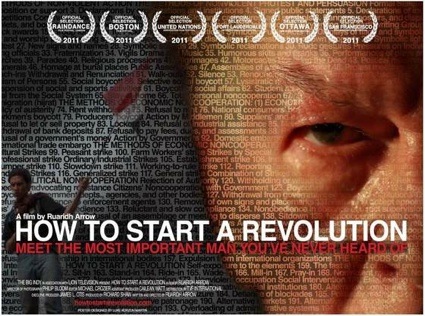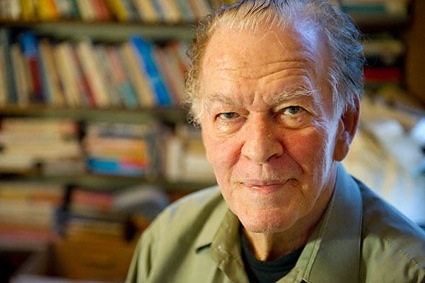Yesterday evening i went to Foto8 in London again for the screening of How to Start a Revolution, a documentary tracing the global influence exercised by the work of Gene Sharp, the world leading expert in nonviolent struggle. Investigative journalist Ruaridh Arrow who directed the movie was there to introduce the film and later on to answer our questions. He was accompanied in the Q&A by Jamila Raqib. She’s Sharp’s close collaborator and the executive director at the Albert Einstein Institution, a non-profit organisation Sharp founded in 1983 to study strategic non-violent resistance.
Although the American academic’s seminal essay From Dictatorship to Democracy: A conceptual framework for liberation has toured the countries living under dictatorship for decades now, i only got to know his work last Summer when Willem Velthoven told me about it on a day i was visiting Mediamatic in Amsterdam.
Sharp believes that non-violent struggle has a greater chance of success than violent resistance, because violence is typically the most powerful weapon used tyrannical regimes and they will always have the upper hand. His booklet From Dictatorship to Democracy (which you can download as a PDF) provide a list of 198 “non-violent weapons”, including mock awards, alternative communication system, wearing of symbols, pray-in, boycott of elections, withdrawal of bank deposits, consumers’ boycott, renouncing honours, etc.
The book was first published in 1993 to support the opposition movement in Burma and was circulated among dissidents. Anyone seen carrying the book around was sentenced to seven-year prison terms by the regime. This kind of manual for toppling dictators has since inspired opponents of oppression in places as far apart as Thailand, Ukraine, Serbia, Estonia, Iran, China, Indonesia, Zimbabwe, and more recently in Syria, Egypt and elsewhere in the Middle East.

Sharp’s work which is committed to the defense of freedom, democracy, and the reduction of political violence doesn’t always receive the praise one would think they deserve. Some regimes have accused him of being a CIA agent and the Albert Einstein Institution he founded struggles to find funding.

The film How to Start a Revolution uses extended interviews with Gene Sharp. Now in his mid-eighties, Sharp hardly ever leaves Boston where he runs the non-profit Albert Einstein Institution and dedicates his free time to orchids. There are also long contributions from his assistant Jamila Raqib, and from Robert Helvey, a retired US army colonel with whom Sharp worked in Burma and who has remained his ally since, training activists in various parts of the world to practice peaceful resistance. The film also includes testimony from key players in the Serbian revolution and activists involved in non-violent unrest in the Middle East.
How to Start a Revolution has been described as the unofficial film of the Occupy movement and was shown in Occupy camps in cities all over the world. In an Q&A with Aljazeera, Gene Sharp’s reaction to the question What advice would you give to the Occupy movement? was the following:
I think they need to study how they can actually change the things they don’t like, because simply sitting or staying in a certain place will not change or improve the economic or political system.
This is Ruaridh Arrow’s first documentary and it has already received numerous awards. It’s easy to understand why: we are in critical need to hear more about Sharp’s thinking and the film traces the impact of his work with clarity. It’s an energizing movie, it gives hope in a time when newspapers deride any attempt at optimism. However, the film isn’t flawless. The music was a bit too emphatic, with trumpets and pathos to highlight the moments when tyranny hits the dirt. The images didn’t need added drama. Neither did i need to witness anyone’s parking skills at length. It would have been helpful to be able to read on the screen for more than 2 seconds the names of the interviewees. But these are minor grudges. I wish How to Start a Revolution was available online. Like Sharp’s booklet, it should be distributed widely.

How to Start a Revolution film will be shown in the UK Houses of Parliament on 1 February. Check out the facebook page to read about upcoming screenings.
